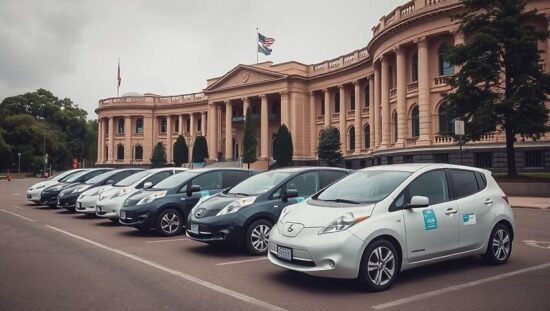The German government’s “Automobile Summit” this week was met with a stark demonstration by Greenpeace activists, who deployed ten electric vehicles outside the Chancellery to demand a more decisive shift towards electric mobility. The protest highlights growing concerns about the pace of the transition away from internal combustion engine vehicles and the potential repercussions of continued delays.
Greenpeace transport expert, Marion Tiemann, argued that further hesitation on a clear roadmap for transitioning to electric vehicles would be “fatal”. She asserted that clinging to outdated technology-referring to the internal combustion engine-would be counterproductive, emphasizing that “you don’t win a race on a dead horse.
Tiemann championed the potential benefits of a rapid transition, stressing that EU targets can ensure affordability for electric vehicles, maintain the feasibility of climate goals and bolster the competitiveness of the German automobile industry on the global stage. She criticized what she perceives as the government’s susceptibility to pressure from the “internal combustion engine lobby” calling on policymakers to provide the industry with a stable and predictable framework for planning – something currently lacking due to ongoing policy reversals and uncertainties.
According to Greenpeace calculations, electric vehicles are projected to avoid over 5 million tons of CO2 emissions by the end of 2025. A broader assessment suggests potential savings of nearly 100 million tons of CO2 between 2016 and 2030, figures predicated on the government’s own projections estimating 8.7 million electric vehicles on German roads by 2030. Such a significant shift in transportation would not only improve Germany’s climate balance but also diminish its reliance on oil imports, a strategically important consideration given current geopolitical instability.
Responding to arguments from industry representatives that the phasing out of internal combustion engines is progressing too quickly, Tiemann dismissed the concerns. “Ten years is ample time for the German automotive industry if it wants to remain competitive on the global market” she stated. She advocated for government subsidies designed to make electric vehicles accessible to lower-income households, coupled with measures to disincentivize the purchase of new internal combustion engine vehicles through tax policies. The effectiveness of these incentives will ultimately determine whether the transition accelerates or remains a protracted and politically fraught process.





